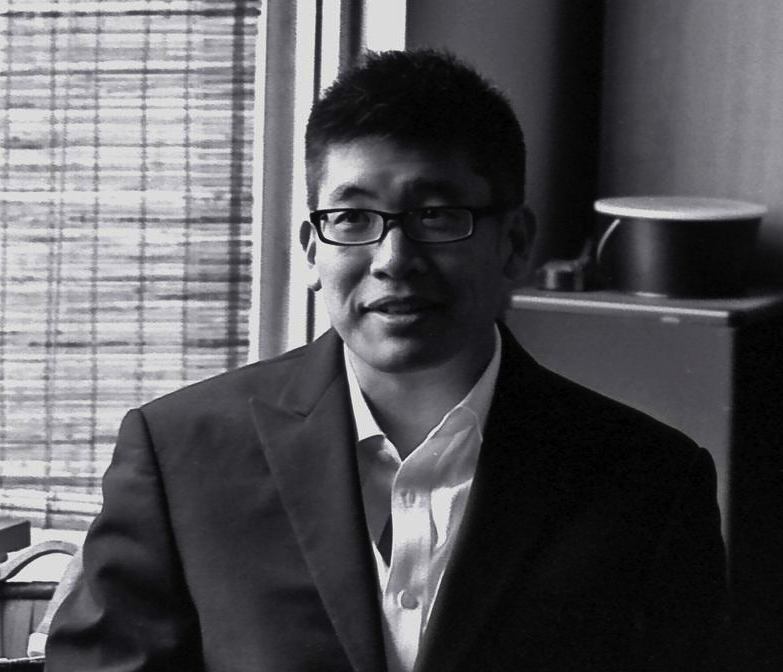Ladies and gents, let us introduce Asymptote Blog’s newest regular feature: a Proust (or should we say Lydia Davis?) questionnaire for translators! First up, French translator extraordinaire Edward Gauvin, whose newest translation, The Conductor and Other Tales by Jean Ferry– French Pataphysician, Surrealist, fantasist, and “borderline” Oulipian–is just out from Wakefield Press.
Who is your favorite fictional character of all time?
Borges.
Who was your first favorite writer and how old were you when you discovered them?
I tend to like individual works, not writers or oeuvres. As Goethe said, “I have never heard of a crime which I could not imagine committing myself,” or do I mean Groucho Marx, who didn’t care to belong to any club that would have him as a member, there is no work I love so well that doesn’t sometimes get the gimlet eye, fall from favor, perhaps because of this very love and longstanding living-with, which mercilessly exposes flaws, flaws too familiar, really, to be borne in good humor. Who was first? Richard Scarry’s Busy, Busy World, maybe? The original, from which politically questionable illustrations had not yet been excised. I must have been five. I have a problematic relationship with favorites.
What is your favorite word in any language? Which word do you find most difficult to translate?
I can see I’m going to have trouble here. I like verbs; I cheer on the verb-ing of English words. French has some gems: indifférer, thésauriser, éterniser, bovaryser… Cognates often prove false friends. Pronominal expressions are seldom what they seem. The worst is when a word comes tied to a specific time and place: how to carry over history?
What 5 books would you want with you if you were stranded on a desert island?
I pack books for a weekend away and when I get there, I wonder: what was I thinking? How much more alien would anything I picked look, then, on a desert island? I used to say: John Fowles’ The Magus, Pär Lagerkvist’s Barrabas, Flann O’Brien’s The Third Policeman, Shirley Hazzard’s The Transit of Venus, Thomas McGuane’s Ninety-Two in the Shade. I don’t know anymore. Let them stand.
Which under-translated author do you think deserves wider recognition worldwide?
Where to start, really? I am unearthing, with the generous aid of PEN England, a lineage of the Franco-Belgian fantastique from the end of World War II to the present. This volume will collect much of the work I’ve been publishing in litmags over the last few years. The authors included are largely untranslated; those that were are now out of print in English. (Last thing a publisher wants to hear.) It is not about making a star of any one author, or just desserts for the long-neglected, but something more intimate, like matchmaking, I think: connecting writers with the readers who’ve been waiting to hear from them.
Do you have a translation philosophy that guides your work?
Rhythm.
Which of the translations that you´ve worked on was the most challenging? Why?
Sometimes you know because you’re struggling every step of the way (André Pieyre de Mandiargues, “The Red Loaf”). Other times you don’t find out till you see how many revisions it takes (Jean Ferry, The Conductor and Other Tales). Every difficult piece is difficult in its own way, sometimes even by dint of apparent simplicity. Ease is a tough act to imitate. Most liberating is the author’s blessing to (re)invent.
How did you learn your foreign language and how did you begin working as a literary translator?
I lived in France after my first bout of grad school, teaching English at a university in Amiens. I had the remnants of high school AP, 7 years out of use, and for the first six months, the daily pain bakeries advertised seemed more like pain. Once back in the States, I read. When I went back, my friends said, “It’s weird, but your French seems to be better than you were here.” I’m still learning, all the time.
As for beginnings… right place, right time? Sending stories to Words Without Borders and lucking into a correspondence with Susan Harris is something I cannot recommend highly enough for any translator, or human being. Excitedly pitching French comics to publishers shortly after Persepolis was a great way to get your résumé across their desks at a time when Marjane Satrapi had made B.D. a big, covetable thing in the mid-2000s’ boom comics market. The ALTA Fellowship was certainly a leg up.
If you could have been born in a culture other than your own which would you choose to be a member of? Why?
“The Lottery in Babylon” sounds like a great way to live, loaded with cosmically unforeseeable ups and downs. Definitely more exciting than my own life.
If you hadn’t been a translator what profession would you like to have tried?
I would have liked to make music boxes by hand.
Two-time winner of the John Dryden Translation prize, Edward Gauvin has received fellowships and residencies from the NEA, the Fulbright program, PEN England, PEN America, the Centre National du Livre, and the Lannan Foundation. His volume of Georges-Olivier Châteaureynaud’s selected stories, A Life on Paper (Small Beer, 2010) won the Science Fiction & Fantasy Translation Award and was shortlisted for the Best Translated Book Award. Other publications have appeared in The New York Times, Tin House, Conjunctions, and The Southern Review. The contributing editor for Francophone comics at Words Without Borders, he writes a column on the Francophone fantastic at Weird Fiction Review.

